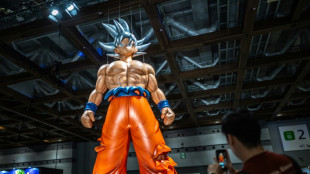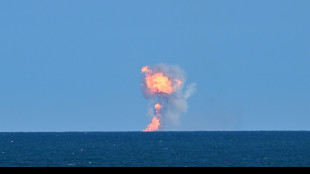
-
 US envoy presses Israel-Hezbollah truce bid in Lebanon visit
US envoy presses Israel-Hezbollah truce bid in Lebanon visit
-
'No controversy' around Alldritt exclusion for Argentina Test

-
 Stock markets gain, dollar higher before Nvidia earnings
Stock markets gain, dollar higher before Nvidia earnings
-
New WHO financing mechanism put to the test

-
 Besigye kidnapping: Uganda president's doctor turned rival
Besigye kidnapping: Uganda president's doctor turned rival
-
Star K-pop producer of NewJeans quits after legal spat with BTS agency

-
 'Eternal' Nadal leaves legacy as he retires from tennis
'Eternal' Nadal leaves legacy as he retires from tennis
-
Vieira takes over at struggling Gerona

-
 Australia's Kerevi banned for Morgan tackle
Australia's Kerevi banned for Morgan tackle
-
Bellamy defies 'lunatic' reputation to inspire Wales revival

-
 Kremlin says US 'doing everything' to prolong 'war' in Ukraine
Kremlin says US 'doing everything' to prolong 'war' in Ukraine
-
Magritte painting nets auction record of $121 million

-
 Markets fluctuate as traders weigh geopolitical tensions
Markets fluctuate as traders weigh geopolitical tensions
-
N. Korea's latest weapon? Bombarding South with noise

-
 'Kidnapped' Uganda opposition figure Besigye to appear at military court: lawyer
'Kidnapped' Uganda opposition figure Besigye to appear at military court: lawyer
-
Asian markets fluctuate as traders weigh geopolitical tensions

-
 'An inauspicious day': the landmines ruining Myanmar lives
'An inauspicious day': the landmines ruining Myanmar lives
-
UN to vote again on Gaza ceasefire, US plans unclear

-
 Japan's manga powerhouse 'Dragon Ball' turns 40
Japan's manga powerhouse 'Dragon Ball' turns 40
-
Japanese, Koreans bottom of global love life survey

-
 Son blames 'mistakes' after South Korea held by Palestine in qualifier
Son blames 'mistakes' after South Korea held by Palestine in qualifier
-
Japan ramps up tech ambitions with $65 bn for AI, chips

-
 Lights, action, melodrama! Silent films get new reel at London haven
Lights, action, melodrama! Silent films get new reel at London haven
-
Myanmar led world in landmine victims in 2023: monitor

-
 ICC to sentence Timbuktu war criminal
ICC to sentence Timbuktu war criminal
-
Ugandan opposition figure Besigye 'kidnapped', says wife

-
 Australia's Jason Day eyes more major glory after resurgence
Australia's Jason Day eyes more major glory after resurgence
-
Machu Picchu security boosted after visitors spread human ashes

-
 Popovic hails Australia character in 'crazy' World Cup qualifier
Popovic hails Australia character in 'crazy' World Cup qualifier
-
Taliban govt clearing 'un-Islamic' books from Afghanistan shelves

-
 Argentina beat Peru as Uruguay hold Brazil
Argentina beat Peru as Uruguay hold Brazil
-
Asian markets struggle as traders weigh geopolitical tensions

-
 Tatum stars as Celtics end Cavaliers unbeaten start
Tatum stars as Celtics end Cavaliers unbeaten start
-
Hurting India under pressure in blockbuster five-Test Australia series

-
 'They killed her dream': Israel strike leaves woman footballer in coma
'They killed her dream': Israel strike leaves woman footballer in coma
-
Iraq holds its first census in nearly 40 years

-
 Iraqis face tough homecoming a decade after IS rampage
Iraqis face tough homecoming a decade after IS rampage
-
Russian net tightens around last civilians left in eastern Ukraine

-
 Olympic champion Tebogo aims to inspire next generation of African athletes
Olympic champion Tebogo aims to inspire next generation of African athletes
-
Valencia on target as ten-man Ecuador upset Colombia

-
 'Rust' to premiere three years after on-set shooting
'Rust' to premiere three years after on-set shooting
-
Strike at French cognac maker Hennessy over measures in China spat

-
 Xi, Lula meet in Brasilia to 'enhance ties'
Xi, Lula meet in Brasilia to 'enhance ties'
-
SpaceX fails to repeat Starship booster catch, as Trump watches on

-
 'I have left a legacy': Nadal retires from tennis
'I have left a legacy': Nadal retires from tennis
-
US recognizes Venezuela opposition's Gonzalez Urrutia as 'president-elect'

-
 European powers, US seek to censure Iran at UN nuclear watchdog board
European powers, US seek to censure Iran at UN nuclear watchdog board
-
UNAIDS chief says husband, Ugandan opposition figure Besigye, 'kidnapped'

-
 Nadal's sensational career ends as Netherlands defeat Spain in Davis Cup
Nadal's sensational career ends as Netherlands defeat Spain in Davis Cup
-
US announces talks with Israel over civilian casualties in Gaza


Mariupol's tunnel warriors seek to slow Russian onslaught
As Russian forces close in on the southern Ukrainian port city of Mariupol, a small number of resistance fighters hope to slow them down using a tunnel system below a vast industrial site as their base.
Experts say the fall of the city, seen as strategically vital for Russian plans to attack eastern Ukraine, is inevitable.
But holdouts in their underground bases hope to make conquering the Sea of Azov port as hard as possible for the attackers.
The urban landscape where the Ukrainian resistance plans to take on the invaders seems almost tailor-made for guerrilla warfare, with sprawling rail lines, warehouses, coal furnaces, factories, chimneys and tunnels.
The maze-like area is a metal works complex, Azovstal, owned by Metinvest, which is run by Ukraine's richest man Rinat Akhmetov.
It has been the focus of urban fighting in Mariupol, just like the nearby Azovmash factory which makes rail components, cranes and other large metal structures.
"It's a city within a city," said Eduard Basurin, a representative for pro-Russian separatists in the eastern Donetsk region.
"There are several underground levels that date back to Soviet times which you can't bombard from above. You have to go underground to clean them out, and that will take time."
Entering the tunnels would be all but impossible for Russian troops, according to Alexander Grinberg, analyst at the Jerusalem Institute for Strategy and Security.
- 'They can try' -
"They can try, but they'll be slaughtered because the defenders of the tunnel will absolutely have the tactical upper hand," he told AFP.
Fighters have in the past used tunnel systems to great effect in their struggle against superior forces.
The Viet Cong made the vast Cu Chi tunnel system near Saigon a base for attacks against US troops and Hamas has used tunnels in their fight against the Israeli army.
The Islamic State group's tunnel system in Mosul, Iraq, allowed its fighters to surprise American troops with sudden appearances seemingly out of nowhere.
But the most memorable example dates back to World War II and the battle of Stalingrad with its fierce fighting in the Red October industrial complex.
"The Soviets used underground passages, sewers and tunnels to get behind German lines," a French military source told AFP.
A sapper unit discovered a former factory used by German troops, stacked three tonnes of explosives underneath and blew up the entire complex, burying the Germans in the rubble, the source said.
The astute use of tunnels has lost none of its effectiveness in the 80 years since, rendering enemy artillery, air strikes and snipers virtually useless.
Satellite surveillance is also of limited use against combatants hiding below ground, as is technical intelligence, the spying on enemy weapons.
However, as analysts point out, the underground system only works if the network is vast and fighters have enough ammunition, food and water, which requires meticulous advance planning.
Soldiers deployed underground also need extremely good training to be operational in this unusual combat environment, said James Rands at British defence intelligence specialists Janes.
- 'Inherent dangers' -
"The enclosed spaces mean engagements occur at shorter ranges, limiting the effectiveness of some small arms," he said.
Close-range use of weapons also carries "a significant risk of tunnel collapse and inherent dangers to the forces employing them", he said.
In addition, commanding troops underground is difficult because standard communications do not work well, and tunnel networks are not usually well mapped, he said.
The evacuation of wounded soldiers is also very cumbersome, Rands added.
Despite all the advantages for the defenders, the tunnel network can possibly still be taken if, as is likely, the Ukrainians lack key equipment in sufficient quantity, such as night-vision gear, analysts said.
It may also be difficult to counter the potential use by the Russians of large quantities of water to flood the tunnels, or of gas or chemical products to force the Ukrainians to the surface.
Although Russian President Vladimir Putin said Tuesday that Russia was pursuing its Ukraine operation "calmly", there is a chance that the tunnel wars will be anything but -- and last for some time.
A.Williams--AT
